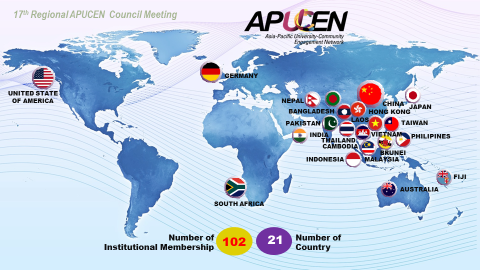Map Apucen

LIST OF COUNCIL MEMBERS 2014-2017
| UNIVERSITY | COUNTRY |
| Universiti Sains Malaysia (PRESIDENT) | Malaysia |
| Kyoto Universities of Foreign Studies (VICE PRESIDENT) | Japan |
| Chulalongkorn University | Thailand |
| Chiang Mai University | Thailand |
| National University of Sciences and Technology | Pakistan |
| Universitas Andalas | Indonesia |
| Thammasat University | Thailand |
| San Pedro College | Philippines |
| Universitas Pendidikan Indonesia | Indonesia |
| Universiti Putra Malaysia | Malaysia |
| Universiti Sains Islam Malaysia | Malaysia |
| University of Surabaya | Indonesia |
| Universiti Utara Malaysia | Malaysia |
| Kolej Universiti Perguruan Ugama Seri Begawan | Brunei |
The APUCEN logo is designed to direct the viewer’s eyes to the centre where we see the interlocking of the letters U & C. This interlocking of the two letters symbolises the partnership between universities and communities to address issues pertaining to the improvement of the quality of life in different contexts of need. This interlocking also signifies the mutually respectful and two way sharing of resources and knowledge between the two parties. The rainbow spectrums of the letter C is indicative of the diversity of cultures and multi-faceted character of societies that are found in the Asia-Pacific region that needs to be acknowledged, respected and celebrated.
ASIA-PACIFIC UNIVERSITY-COMMUNITY ENGAGEMENT NETWORK (APUCEN)
‘The hallmark of engagement is the development of partnerships that ensure a mutually beneficial exchange of knowledge between the University and the community’(Holland & Ramaley, 2008).
 Asia-Pacific University - Community Engagement Network (APUCEN) is a regional network of academic institutions of higher learning concerned with promoting the culture of university-community engagement in a proactive, inclusive, holistic and participatory way APUCEN is motivated by the belief that institutions of higher learning and the community can collaborative to generate ideas on how to improve the quality of life of the society in the Asia Pacofoc region. Community engagement, from the viewpoint of APUCEN goes beyond outreach and extension or service. Instead, APUCEN is committed to the idea that universities should seek mutually beneficial relationships and partnerships with communities to address communities’ issues and needs; with a commitment to sharing and reciprocity that is guided by mutual respect among the partners.
Asia-Pacific University - Community Engagement Network (APUCEN) is a regional network of academic institutions of higher learning concerned with promoting the culture of university-community engagement in a proactive, inclusive, holistic and participatory way APUCEN is motivated by the belief that institutions of higher learning and the community can collaborative to generate ideas on how to improve the quality of life of the society in the Asia Pacofoc region. Community engagement, from the viewpoint of APUCEN goes beyond outreach and extension or service. Instead, APUCEN is committed to the idea that universities should seek mutually beneficial relationships and partnerships with communities to address communities’ issues and needs; with a commitment to sharing and reciprocity that is guided by mutual respect among the partners.
The emerging trends in higher education placed a higher than ever expectations on universities. Institutions of higher learning are expected by the community and the government to make meaningful and tangible contribution to national, regional and international growth and well-being. APUCEN passionately believes that if universities are to achieve their mission to develop and apply knowledge with society in mind, then their core functions have to build not only on an academic base but also upon an intellectual civil base that can offer solutions to societal problems. APUCEN acknowledges the immediate needs for universities to embark on university-community engagement due to current changes in knowledge generation and diffusion, the need to address critical social, economic, cultural, and environmental concerns, to encourage engaged learning and to acknowledge academic involvement in nation building.
The increasing need for a home grown Asia Pacific network that not only addresses the immediate needs discussed above and but also having a network that appreciates the aspiration of the Asia-Pacific region inspired the setting up of APUCEN. APUCEN subscribes to the concept of an engaged institution that better address local/regional issues and problems with approaches/solutions that better suit local/regional cultures and values. In this, the adoption of local wisdom is encouraged.
APUCEN also acknowledges that volunteerism is pivotal in the development of a broader strategy of university-community engagement. Volunteerism is the pulse of APUCEN’s existence, for the spirit of volunteerism is strongly felt not just within APUCEN’s guiding principles and objectives but it is also strongly embedded in the type of projects it is associated with. With this in mind, volunteerism in institutions of higher learning is seen as a ‘two-way knowledge exchange’ by allowing both academicians and students to gain new perspectives, share and create knowledge with the community, enhance the quality of life for the surrounding communities and enable both parties to identify their critical needs.
APUCEN envisage making real difference to university-community partnership to informed progress particularly for the bottom billion or the underprivileged. It is in line with APUCEN’s aspiration to unite civil society and higher learning institutions and networks in common efforts to co-create knowledge, mobilize it to inform practice and policy, and improve the quality of life of the society within the region.